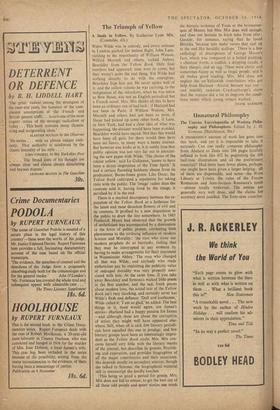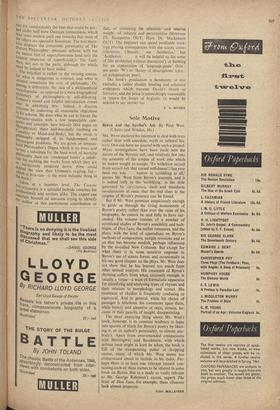Unnatural Philosophy
The Concise Encyclopaedia of Western Philo- sophy and Philosophers. Edited by J. 0. Urmson. (Hutchinson, 50s.) A TREMENDOUS amount of work has gone into this book, and yet it is impossible to take it seriously. Can one really compress philosophy from Abelard to Zeno into 286 pages (craftily inflated to look like 412 by paginating the 104 half-tone illustrations and all the preliminary material)? Had there been fewer plates, perhaps, one might have been given a larger helping: all of them are dispensable, and some—the Wren Library at Trinity, the ruins of the Forum Romanum and Jean-Jacques Rousseau's tomb —almost totally irrelevant. The entries are generally very well done, and the claims for accuracy seem justified. The forty-nine contribu-
tors arc unmistakably the best that could be got: just under half have Oxonian connections, which may seem modest until one remarks that most of the others are specialist historians. The text there- fore displays the composite personality of The Oxford Philosopher--pleasant, urbane, with but the merest hint of superciliousness (and only the faintest suspicion of superficiality). The fault, then, lies not in the parts, although the whole must be judged to have failed
The mischief is rather in the missing entries, for what is dangerous is omitted, and what is
omitted constitutes the core of philosophy. Or,
Putting it differently, the idea of a philosophical enoYcloptedia—as opposed to a mere biographical dictionary of philosophers--is self-defeating. Urmson's sound and helpful introduction comes near to admitting this: indeed, it disarms criticism by endorsing all reasonable objections to his scheme. He does what he can to leaven the character-studies with a few respectable cate-
B?ries and concepts, here bravely (five pages on
r.metaPhysics), there half-heartedly (nothing on Causality Y or Mind-and-Body), but the result is Philosophy stripped of its fundamental and 1osigent problems. are given an ernascu- n'ed Philosopher's Digestt which is no more and no less a substitute for the hard work of learning
Philosophy than are 'condensed books' a substi- tute
for tackling the works from which they are de assiduously rendered down. (One could Wetlend the view that Urmson's reading list— the Which is first-rate—is the most valuable thing in book.)
Taken at a humbler level, The Concise
8 Professionals is a splendid bedside omnibus for Professionals and novices alike. The expert can entertain himself ad nauseam trying to identify 'ac author of this anonymous contribution or that, or criticising the selection—and relative ' weight—of subjects and personalities (Strawson IN, Hampshire OUT; Hare IN, Mackinnon OUT). The beginner can spend profitable even- ings playing consequences with the scanty cross- references ('Beauty : see Aesthetics,' but `Aesthetics: . . . it will be helpful to list some of [the problems] without discussion'), or hunting for an explanation of language-game' (hint : see under 'W') or 'theory of descriptions' (clue: an octogenarian peer).
The book's production is handsome, if one excludes a rather shoddy binding and coloured endpapers which travesty David's Death of Socrates; and the price is astonishingly reasonable in return for hours of hygienic lit would be unkind to say sterile) fun R. A. BECHER







































 Previous page
Previous page